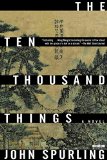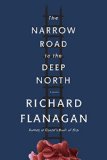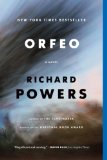Summary | Excerpt | Reviews | Beyond the book | Read-Alikes | Genres & Themes | Author Bio

Critics' Opinion:
Readers' Opinion:
First Published:
Apr 2014, 400 pages
Paperback:
Apr 2015, 368 pages
 Book Reviewed by:
Book Reviewed by:
Poornima Apte
Buy This Book
It might have been the ancient Greek philosopher Socrates who once said that an unexamined life is not worth living, but his lessons are remarkably well applied in the novel, The Ten Thousand Things, set in 14th-century China. Author John Spurling has modeled his fictional protagonist Wang Meng by hewing closely to the real-life equivalent, one of the Four Masters of The Yuan and best known for his Chinese landscape painting (see Beyond the Book). Wang Meng's life spanned one of China's most turbulent times: when the end of Kublai Khan's 90-year Mongol empire lead to civil war and anarchy, eventually crowning a new emperor, Zhu Yuanzhang, who launched the Ming dynasty.
As the novel opens, Wang Meng is seventy-eight years old and in jail charged with conspiracy against the government because he attended a private viewing of art. Confused and irritated by this punishment, Wang narrates the story of his life to bide his time. Using a landscape painting as metaphor, he describes his assignment: "I shall be the scholar in the bottom corner of the painting who stands on a convenient crag and carries the viewer's eye away from himself and into the landscape. But in this case I shall also be one of the landscape's inhabitants." Spurling achieves this spectator's distance by narrating most of the story in third person. Wang might be an active player in the narrative (this is primarily his story after all) but the third-person narrative distance allows him to emphasize the role of fate in determining how things play out. It is also true that Wang himself tends to extreme passivity at times, but he is understandably swept along by history's turbulent times.
As the story progresses, we launch on a travelogue of sorts as Wang travels the countryside meeting famous characters from his time: fellow artist Ni Zan, a warrior chieftain known as The White Tigress, and even the humble monk apprentice Zhu, who later becomes Emperor. Throughout, Wang subtly analyzes the Ten Thousand Things, the many facets that make up life.
Coming from royal lineage (the Song Dynasty, who ruled before the Mongol's Yuan dynasty) and serving as an official in the Mongol empire, Wang is especially torn by questions related to loyalty and service: Is it better to stay true to your ancestry and stay away from service to the Mongols or to be a part of the administration, if for no reason other than to make sure things don't go completely awry? Notions of fealty and loyalty to family loom large and weigh uneasily on his conscience. Even his indulgence in art seems, at times, like a waste to Wang. Brought up on the notion that service to nation comes above everything else, painting seems like a leisure pursuit he can ill afford. As his grandfather Meng, also a renowned painter and public servant tells him once: "For people of our class, art is a recreation and a pleasurable adventure, but not a substitute for public duty."
One of the greatest pleasures of this novel is seeing fourteenth-century China come vibrantly alive. The countryside is painted in rich evocative detail and readers will be completely transported. Despite being thoroughly soaked in the history and atmosphere, there are times when it's hard to tamp down the cynic, to not wonder if we are attracted to the narrative style, the touch of the exotic (a country retreat for example, has a Jade and Peacock Pavilion with the birds roaming around on its grounds) because it conforms to the preconceived notions of the period we might already harbor. Since only an expert in Chinese history can answer to that fact (and I am not one), suffice it to say that the recreation seems to be incredibly authentic and indicative of thorough research.
It is striking that a novel set hundreds of years ago in China can have lessons that resonate even in our times. Spurling has us contemplate our own lives; revisit what values we hold dear over others. He makes us consider the role of duty and passion and what we would do if the two don't align. "The Ten Thousand Things," after all, never fade away. They take different avatars and ring with varying resonance for different people through the generations.
The beauty of John Spurling's novel is that it is at once an incredibly detailed story and a sweeping view of the times. "Our lives are very small and short, and history makes them seem smaller and shorter," says the White Tigress in the story. The grand canvas of this exquisite novel certainly drives home the point well. In a sense, The Ten Thousand Things is not unlike a beautiful Wang Meng landscape painting - full of intricate gorgeous details that together coalesce into one stunning work of art.
Additional Information
John Spurling talks about why he felt compelled to write The Ten Thousand Things in The Spectator.
![]() This review was originally published in The BookBrowse Review in April 2014, and has been updated for the
April 2015 edition.
Click here to go to this issue.
This review was originally published in The BookBrowse Review in April 2014, and has been updated for the
April 2015 edition.
Click here to go to this issue.

If you liked The Ten Thousand Things, try these:

The Narrow Road to the Deep North
by Richard Flanagan
Published 2015
Moving deftly from a Japanese POW camp to contemporary Australia, this savagely beautiful novel tells a story of love, death, and family, exploring the many forms of good and evil, war and truth, guilt and transcendence.

by Richard Powers
Published 2014
The National Book Award–winning author of The Echo Maker delivers his most emotionally charged novel to date, inspired by the myth of Orpheus.





The Funeral Cryer by Wenyan Lu
Debut novelist Wenyan Lu brings us this witty yet profound story about one woman's midlife reawakening in contemporary rural China.
Your guide toexceptional books
BookBrowse seeks out and recommends the best in contemporary fiction and nonfiction—books that not only engage and entertain but also deepen our understanding of ourselves and the world around us.